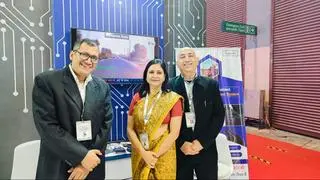Impact investment venture capital firm Lok Capital is in the process of raising its third fund and Venky Natarajan, its 45-year-old Managing Partner, is confident that Lok will be able to raise the targeted $100 million.
“There is sufficient appetite,” he says. The main reason, he adds, is that the core team has stuck together over these years. This matters a lot to investors. Second, and equally important, is that Lok has delivered on what it had promised its investors in the first two funds.
“We have delivered both in terms of the financial and the social return. We did not over-promise. We promised optimally and delivered what we promised,” says Venky. He says Lok will start investing out of its third fund by January. Lok had raised a total of $87 million in two funds — $22 million in the first and $65 million in the second. It has more or less invested all the money it raised through the two funds, except for some follow-on investing. The money raised and invested is “peanuts when compared to what is required.”
Successful business modelsIn the nearly 10 years of its existence, Lok has understood the models that will work for delivering impact. Some ventures can be run purely as a private company, some will work better in a public-private partnership model and certain models will not work in delivering impact. For the last category, sanctioning grants will have to be the way to go till such time there is sufficient awareness, demand for a service or product and willingness to pay for that service or product.
As Lok gets ready for the next phase, with its third fund, Venky believes that its investments will see a greater impact on the target population. For the third fund, Lok will look at overseas investors. Typically, these funds have a longer life and Indian investors want returns quicker than their foreign counterparts.
Lok had raised money from development finance investors and others, including FMO, CDC, IFC, kfW, Proparco, Accion, responsAbility and Triple Jump in the first two funds.
According to Venky, it is wrong to assume that investors in impact investment funds are prepared to forego higher returns on their money for creating impact at the bottom of the pyramid. “Our role,” he says, “is building companies that can deliver impact in a commercially sustainable way.” If a company is trying to deliver a service to the bottom most layer of the pyramid, the commercial sustainability could be low. Likewise, if a venture is operating in some of the poorer States, the commercial viability could be low. “You will have to adjust your return expectations accordingly.”
Balancing actAs a strategy, Lok is able to move vertically within the pyramid and horizontally to some of the poorer geographies. That is, while it invests in a purely commercial set up that has operations in the large cities, it is also investing in ventures that are working in the poorer States. “So, at a portfolio level I am able to balance and create an impact. It will be wrong to assume that because I am an impact fund, my (return) expectations will be lower,” says Venky.
At the end, he adds, Lok would like the companies it invests in to be sustainable. “We have to generate a return. I will try to achieve that at a portfolio level.”
Lok invested in 20 companies from the two funds and has exited from 11 so far. Nearly 70 per cent of its exits were to growth stage investors and in a few, Lok sold its stake to large strategic investors. In the first fund, he says, Lok was able to deliver a 20 per cent return in rupee terms to its investors. Lok invests about $2-3 million (about ₹12-18 crore) in the companies, but is open to either increase or lower its investment depending on the venture. For the third fund too Lok will look at similar ticket size.
Lok has invested in companies in the financial services, healthcare and agriculture sectors. The financial service companies include those offering micro-credit, affordable housing finance, small business finance, commercial vehicles finance.
Venky says with improvements in regulations, especially in the remittances and payments areas, there is scope for investing in them.
Focus areasFrom the third fund, Venky says, Lok will go slow on investments in the energy (solar and bio-mass) and education sectors. The venture capital firm’s focus will be more on financial services and agri-business.
Agri-business is quite exciting, he adds, especially companies that are into contract farming, companies that are working with a large number of farmers and removing intermediaries and improving efficiencies in the supply chain.








Comments
Comments have to be in English, and in full sentences. They cannot be abusive or personal. Please abide by our community guidelines for posting your comments.
We have migrated to a new commenting platform. If you are already a registered user of TheHindu Businessline and logged in, you may continue to engage with our articles. If you do not have an account please register and login to post comments. Users can access their older comments by logging into their accounts on Vuukle.